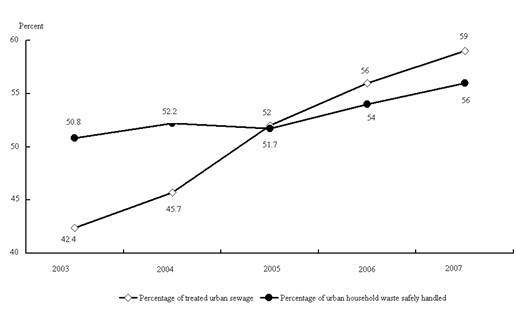4. Steady progress was made in building a resource-conserving and environmentally friendly society.
Efforts to conserve energy and other resources continued to produce more results. We announced a master work plan for saving energy and reducing pollutant emissions and a plan and methods for compiling statistics on and monitoring and assessing progress. In addition, an accountability system for energy conservation and pollution reduction targets has been put in place. Good progress was made in the ten major state projects for energy conservation. Funds from the central government were used to support nearly 700 energy-saving projects that will potentially save 22.5 million tons of standard coal. The campaign to save energy in 1,000 energy-intensive enterprises was carried out in full, resulting in a total saving of more than 20 million tons of standard coal. The second group of pilot projects for a circular economy was launched. New fiscal, tax, financial, pricing and other policies to support energy conservation and pollution reduction efforts were introduced at a faster pace. The new policies raised resource taxes on a number of mineral products, introduced the List of Equipment and Products Entitled to Corporate Income Tax Credit for Energy- and Water Efficiency and Comprehensive Utilization of Resources and set up a system of mandatory government procurement for energy-efficient products. The policy of charging differential electricity rates was tightened and pilot projects to generate and distribute electricity more efficiently were launched. The revised Law on Energy Conservation was promulgated, and a number of energy efficiency standards and quotas for energy consumption in production were set. Efforts were intensified to track compliance with energy conservation and pollution reduction laws and to increase publicity and guidance concerning compliance with these laws.
Further progress was made in the protection and improvement of the ecological environment. We continued to work on key ecological projects such as those to protect virgin forests, bring the sources of sandstorms affecting Beijing and Tianjin under control, build networks of key forest shelterbelts, and protect and improve the Sanjiangyuan Nature Reserve. Since 2003, an additional 31.91 million hectares of the country has been covered with trees, including the forests returned from former farmland, and a total of 34.6 million hectares of grazing land has been returned to grassland. A system of indicators was formulated to assess compliance with clean production standards in 24 industries, including the thermal power, phosphate fertilizer, and lead and zinc industries, and extensive inspections were carried out to ensure clean production in these industries. We continued our efforts to prevent and control pollution in key river valleys and regions, including the Huai, Hai, Liao and Songhua rivers, Tai, Chao and Dianchi lakes, the Three Gorges Reservoir area, the Danjiangkou Reservoir area and its upper reaches, and the Bohai Sea. The percentage of treated urban sewage reached 59 percent and percentage of urban household waste safely handled reached 56 percent, 3 and 2 percentage points higher respectively than the levels of the year before. Breakthrough was made in desulfurizing projects for coal-fired power plants, with desulfurization devices installed in more thermal power plants with a total capacity of 110 million kilowatts, bringing the proportion of China's total thermal power plant capacity with such equipment up to 50 percent. We issued the National Climate Change Program, China's first policy document to comprehensively respond to climate change and the first of its kind produced by a developing country. The program received a positive response from the international community.
Figure 6.
Urban Sewage Treatment and Safe Handling of Urban Household Waste
